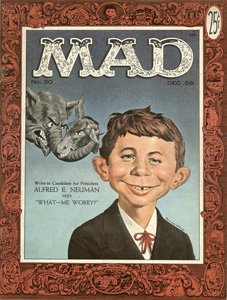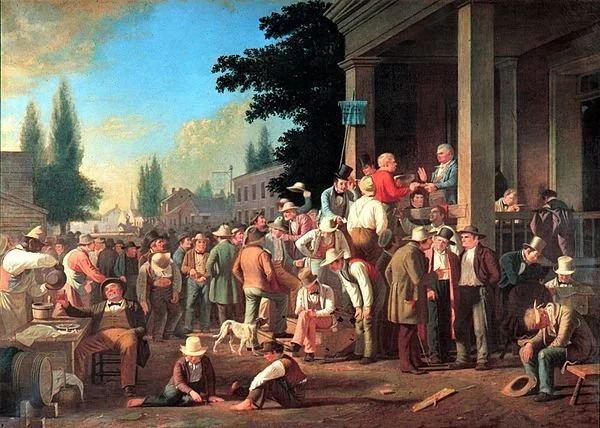
David Warsh: Tim Ryan says time to ‘Leave the age of stupidity behind us’
“An Allegory of Folly” (early 16th century), by Quentin Matsys
— EC Publications
SOMERVILLE, Mass.
It was the one ostensible mistake I made in what I wrote about the run-up to what did in fact turn out to be a nobody-knows-anything election.
To my mind, the most interesting contest in the country is the Senate election involving 10-term Congressman Tim Ryan and Hillbilly Elegy author J. D. Vance, a lawyer and venture capitalist. That’s because, if Ryan soundly defeats Vance, he’s got a good shot at becoming the Democratic presidential nominee in 2024.
Even now I don’t think that I was altogether wrong.
Thanks to the editorial page of The Wall Street Journal, we know why Ryan lost. Vance, who was on the ballot because Donald Trump endorsed him, trailed Ryan by significant margins until mid-summer. That was when Senate Minority Leader Mitch McConnell invested more than $32 million in the Ohio Senate race, via a super-PAC he controlled, 77 percent of all Republican campaign media spending in the Ohio election after mid-August. Most of it was negative “voter education,” enough to tip the balance against “taxing-Tim” for having voted for various Biden measures. The power of money in American elections may be a scandal, but by now it has been well-established by the Supreme Court as a fact of life.
It seems nearly certain to me that the next president will be someone born in the ‘70’s, not the ‘40’s. New York Times columnist Ross Douthat was probably correct when he wrote last week that Florida Gov. Ron DeSantis is likely to be the Republican nominee. DeSantis, 44, was born in 1978.
Douthat may have been wrong, however, in thinking that DeSantis’s “sweeping success” in his re-election campaign validated the theory that “normal” doesn’t have to mean “squishy.” The tough-guy approach worked well in Florida. DeSantis was “an avatar of cultural conservatism, a warrior against the liberal media and Dr. Anthony Fauci, a politician ready to pick a fight with Disney if that’s what the circumstances require.”
But a better-mannered Donald Trump may not be what the majority of voters will be looking for in the next election. Tim Ryan, 49, was born in 1973. If you have time, and want a lift, watch Ryan’s 15-minute concession speech to get a feel for the man. Pay special attention to the six-minute mark, where Ryan speaks to the audience beyond the room he is in.
The words in that middle portion of that speech strike a powerful chord: “This country, we have too much hate, too much anger, there is way too much fear, way too much division. We need more love, more compassion, more concern for each other. These are important things. We need forgiveness, we need grace, we need reconciliation. We do have to leave the age of stupidity behind us.”
There are many question to be answered. First among them: are Ryan and his family willing to undertake a two-year front porch campaign? If so, a 10-term former congressman has a reasonable chance to win both the Democratic Party’s nomination, and the 2024 election itself.
David Warsh, a veteran columnist and an economic historian, is proprietor of Somerville-based economicprincipals.com, where this column first appeared.
David Warsh: Three to watch in the mid-term elections
An 1846 painting by George Caleb Bingham showing a polling judge administering an oath to a voter
SOMERVILLE, Mass.
My Fourth of July resolution was to tune out stories about the possible 2024 presidential ambitions of Donald Trump and Hillary Clinton, and pay attention instead, at least until Nov. 8, to the Senate campaign in Ohio. Author-turned-venture capitalist J.D. Vance and Congressman Tim Ryan are running there to succeed retiring Republican Sen. Rob Portman.
Vance, 37, gained fame as author of Hillbilly Elegy: A Memoir of a Family and Culture in Crisis (2016). After high school, he enlisted in the U.S. Marine Corps and served as a public-affairs specialist in an air wing during the Iraq War. He then graduated from from Ohio State University, went on to Yale Law School and then left a corporate-law practice for a venture-capital firm in San Francisco. He returned to Ohio in 2016 to form, with partners, a venture fund of his own. Formerly an evangelical Protestant, he converted to Roman Catholicism in 2019. He opposes abortion rights.
Ryan. 49, is a 10-term congressman whose present district includes much of northeast Ohio, from Youngstown to Akron. In 2015, he explained to readers of the Akron Beacon Journal “Why I changed my thinking on abortion’’. The next year, he led an ultimately unsuccessful effort to unseat Nancy Pelosi as party leader of the House Democrats.
Might Ryan, if he wins, find a seat on that otherwise still all-but-empty bench of potential 2024 Democratic presidential candidates, at whose opposite end sits Clinton? It is plausible, if not likely. After all, former Ohio Gov. John Kasich had a shot at derailing Trump as Republican nominee in 2016. In any event, lie Vance, Ryan seems likely to remain in public life for years to come.
Jane Coaston, a journalist, is a third star rising in the mid-term elections, and probably well beyond. The New York Times hired her away from Vox last autumn to run a weekly discussion show, The Argument. Coaston grew up in suburban Cincinnati, according to Graham Vyse, of The Washington Post, the daughter of union Democrats who were “giant hippies,” before she learned to distinguish among varieties of conservative thought as editor of The Michigan Review at the University of Michigan. She gained prominence with a National Review article in 2017, “What if there is no such thing as Trumpism?” Her talk-show discussion with two leading Republican theorists after Vance’s Trump-endorsed primary victory in May was especially illuminating.
Control of the Senate will almost certainly become the dominant story of the mid-term elections. The Pennsylvania Senate race is interesting, too. To me, at least, it seems likely, that the Supreme Court’s decision to overturn Roe v. Wade will cost Minority Leader Mitch McConnell (R-Kentucky) his leadership of the Senate. This column is mostly about economics, but the investigation of preferences change is gradually becoming an important part of economics
Immigration, foreign wars, globalization and climate change: All these national issues will take a back seat in November elections, which are about leadership in particular states. They will resurface, along with women’s rights, in 2024. Harvard Historian Jill Lepore wrote a couple years ago that America, like any other nation-state, requires a “national story.” She was right. Voters write it, election by election.
David Warsh, a veteran columnist, is proprietor of Somerville-based economicprincipals.com, where this essay originated.





